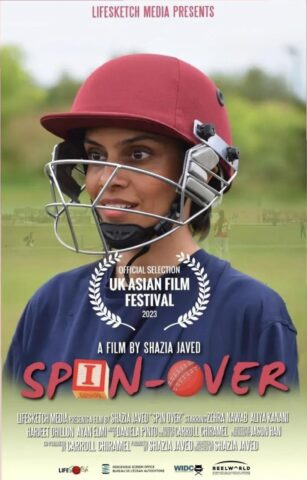In the opening shot of Overtime, a short documentary that recently premiered on TELUS originals, Kelley Lee Gilmore caresses one of her many hockey trophies and comments wistfully on the image of the male player on it: “I had a lot of guys on my trophies.”
Lee Gilmore has been a hockey player — a sport that remains predominantly male — for more than two decades, but she still hesitates to call herself that. She prefers to be known as someone “who likes playing hockey.”
This was one of the reasons that her daughter, British-born Chinese-Caucasian actor and filmmaker, Jenny Lee Gilmore, decided to tell her mother’s inspiring story through her documentary. Overtime follows Vancouver’s Kelley Lee Gilmore, a 60-year-old doctorate, university professor, and a bonafide hockey player. The documentary follows Kelley as she prepares for the upcoming Canada 55+ Games in Kamloops.
“As my mom was getting older, she was talking about herself in a more negative way, Jenny said in the documentary. “Through this film maybe she will see herself the way I see her: Strong, resilient and as a role model.”
The film captures the determination of Kelley, but also shines a spotlight on older women with a similar passion for sport who struggle to be seen and heard. Kelley’s teammates speak about how, when growing up, they were told that hockey is too aggressive, that they could possibly get all their teeth broken and would “never find a husband.” But the one thing that they all agreed on — the hockey rink felt like a home where they were their most authentic selves.
As a young Chinese-Canadian woman, Kelley had to overcome gender and racial biases to be able to pursue her passion for hockey. “As a kid growing up in the mid-70s, in East Vancouver, she wasn’t encouraged to play hockey, even to speak about it when no one else who looked like her was playing at the time,” Jenny says.
“So that must have been hard. Also the financial aspect of it must have been a challenge. When she lived in the UK, she spoke about the racism she faced there which I too experienced first hand till the time I was 13 years old.”
The filmmaker makes a poignant observation about the parallels between her mother’s journey and her own as a filmmaker — areas in which women of colour still remain underrepresented. “Both places, filmmaking and hockey, were not designed for us and not many people look like us in both these areas,” she says.
At its core, Overtime is a touching mother-daughter story where life comes full circle. In one shot, Jenny watches pensively as her mom is on the ice, playing a crucial game just as her mom would have looked and cheered young Jenny on the ice.
“She always encouraged me to play and to pursue the career of my choice. She managed to raise a family, while also having a successful career and pursuing hockey at this level. Her advice to me was to work hard and if I wanted something, go after it!” Jenny says.
Against all odds
Hina Anwar’s character could easily be Kelley Lee Gilmore’s twin — albeit on the cricket pitch. Anwar is the protagonist of Indian-born Canadian filmmaker, Shazia Javed’s short comedy drama, Spin Over.
A woman obviously fatigued by the various roles she plays of homemaker and mother, among others, Anwar is horribly late for cricket tryouts. Has she, with her tardiness, already cemented the stereotype of the all-over-the-place-failed-multitasker or will the talent scouts give her a chance to show off her skills as an ace spin bowler?

Javed captures all these moments and emotions deftly in a short, which is just shy of ten minutes, but makes a huge impact. “I took real-life experiences of the women I know and gave it a fictional spin,” Javed says. “There is a group of South-Asian immigrant women that I play sports with. This is a tribute to them.”
For her film, Javed connected with the women who play at the national level for Canada. She hired some of the players as background actors for the film, even roping in the former captain of the Canadian national team to act as Anwar’s body double.
“I had a tough time getting them to play badly for the film,” she says “They were so generous with their time. They trained my leads on how to hold the bat and throw the ball. Honestly, they are truly inspiring women and I hope to continue working with them as I work towards a longer version of “Spin Over.”
The filmmaker also produced the critically acclaimed documentary, 3 Seconds Divorce about the punishing triple talaq system now banned in India wherein a man could legally divorce his wife by uttering the word “talaq” three times in succession. Javed is passionate about stories with themes of migration, motherhood, isolation, under-employment, discrimination and cultural expectations which show up repeatedly in her work.
“I am very invested in creating fully fleshed characters of South Asian women no matter which genre I work in,” she says.
Like Jenny Lee Gilmore, Javed is happy that immigrant filmmakers are gradually finding their voices in the Canadian film industry and emerging from the periphery to tell their unique stories.
“The opportunities have only now begun to open up for equity-seeking communities to tell their own stories and take control of their narrative,” she says. “When I started out here, no one was entertaining the idea of editorial or creative control. There was a lot of undervaluing or undermining of what we brought to the table.
“Not to say things have changed 100 per cent, but thanks to the advocacy and work of many there is a change. And then there is that other responsibility. Because stories of us and by us are so few, we bear the responsibility of representation.”
Overtime is available to audiences across Canada free on demand on TELUS Optik TV Channel 8 and online at watch.telusoriginals.com worldwide.
Spin Over will be available to audiences soon after it completes its film festival circuit.
Baisakhi Roy is a writer and journalist based in Oakville. Her work has been published in several Canadian media outlets including The Globe and Mail, Huffington Post Canada, Chatelaine, Broadview and CBC. Her areas of interest and expertise lie in the intersections of immigrant life and culture in Canada. She is an avid Bollywood fan and co-hosts the Hindi language podcast KhabardaarPodcast.com.


